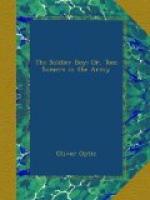The bateau passed them both, and Tom began to breathe easier. The second rebel, finding he could not capture or kill the detested Yankee, went to the assistance of his companion. The soldier boy suspended his exertions, for the danger seemed to be over, and gazed with interest upon the scene which was transpiring in the water just above him. He was anxious to know whether he had killed the rebel or not. There was something awful in the circumstances, for the soldier boy’s sensibilities were too acute to permit him to take a human life, though it was that of an enemy, without producing a deep impression upon his mind. Perhaps, in the great battle in which he had been a participant, he had killed several rebels; if he had done so, he had not seen them fall. This was the first man he had consciously killed or wounded, and the fact was solemn, if not appalling, to the young soldier.
As the rebel raised his companion from the water he seemed to be dead, and Tom was forced to the conclusion that he had killed him. He had done the deed in self-defence, and in the strict line of duty. He could not be blamed even by his enemies for the act. He felt no exultation, and hoped from the bottom of his heart that the man was prepared to meet his Maker, into whose presence he had been so suddenly summoned.
Tom had heard the boys in Pinchbrook talk lightly about killing rebels, and he had talked so himself; but the reality was not so pleasant as it had seemed at a distance. He was sorry for the poor fellow, and wished he had not been obliged to kill him. It was terrible to him, even in battle, to take a human life, to slay a being created in the image of God, and for whom Christ lived and died.
While he was indulging in these sad reflections, he heard a bullet whistle near his head. The Secesh soldier on the shore had loaded up his companions’ muskets, and was doing his best to bring down the lucky fugitive. His last shot was not a bad one, and Tom could not help thinking, if the grayback should hit him, that he would not waste any fine feelings over him. He did not like the sound of those whizzing bullets, and as he had never boasted of his courage, he did not scorn to adopt precautionary measures. The water was three inches deep in the bottom of the bateau; but Tom deemed it prudent to lie down there until the current should bear him out of the reach of the rebel bullets.
He maintained this recumbent posture for half an hour or more, listening to the balls that frequently whistled over his head. Once he ventured to raise his head, and discovered, not one man, but a dozen, on the shore, which accounted for the rapid firing he heard. When he looked up again, his bateau had passed round a bend, and he was no longer exposed to the fire of the enemy.
From his heart Tom thanked God for his escape. He was religiously grateful for the aid which Providence had rendered him, and when he thought how near he had stood to the brink of destruction, he realized how narrow the span between the Here and the Hereafter. And the moral of his reflections was, that if he stood so near to the open gate of death, he ought always to live wisely and well, and ever be prepared to pass the portals which separate time from eternity.




